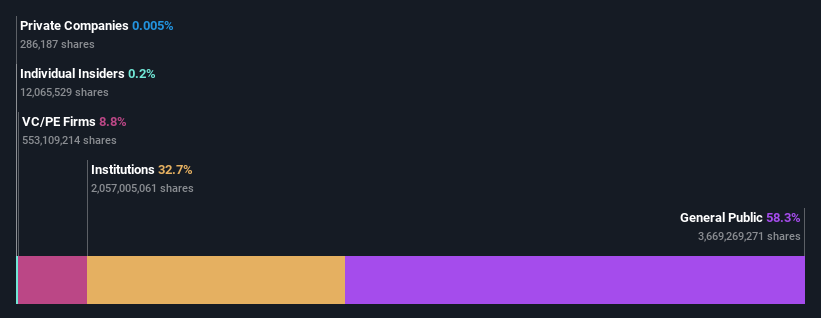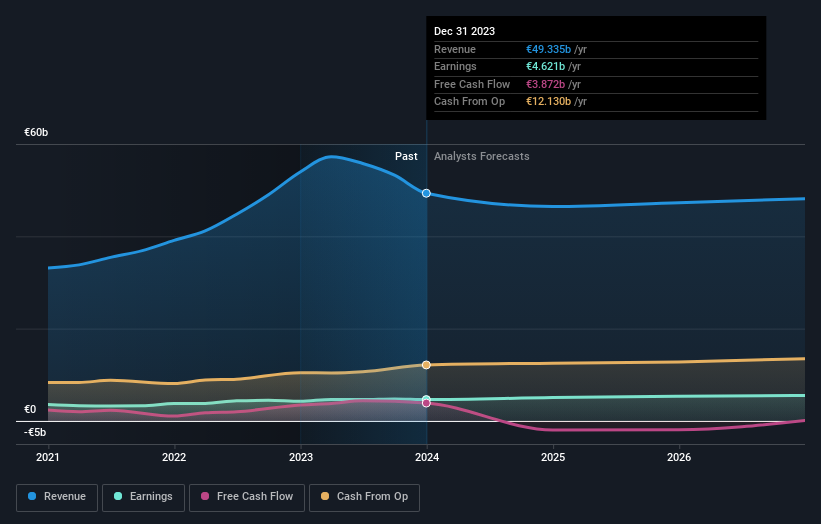Stock Analysis
- Spain
- /
- Electric Utilities
- /
- BME:IBE
Institutions own 33% of Iberdrola, S.A. (BME:IBE) shares but individual investors control 58% of the company

Key Insights
- Significant control over Iberdrola by individual investors implies that the general public has more power to influence management and governance-related decisions
- The top 25 shareholders own 32% of the company
- Institutional ownership in Iberdrola is 33%
Every investor in Iberdrola, S.A. (BME:IBE) should be aware of the most powerful shareholder groups. With 58% stake, individual investors possess the maximum shares in the company. That is, the group stands to benefit the most if the stock rises (or lose the most if there is a downturn).
Meanwhile, institutions make up 33% of the company’s shareholders. Generally speaking, as a company grows, institutions will increase their ownership. Conversely, insiders often decrease their ownership over time.
Let's take a closer look to see what the different types of shareholders can tell us about Iberdrola.
View our latest analysis for Iberdrola

What Does The Institutional Ownership Tell Us About Iberdrola?
Institutional investors commonly compare their own returns to the returns of a commonly followed index. So they generally do consider buying larger companies that are included in the relevant benchmark index.
Iberdrola already has institutions on the share registry. Indeed, they own a respectable stake in the company. This implies the analysts working for those institutions have looked at the stock and they like it. But just like anyone else, they could be wrong. It is not uncommon to see a big share price drop if two large institutional investors try to sell out of a stock at the same time. So it is worth checking the past earnings trajectory of Iberdrola, (below). Of course, keep in mind that there are other factors to consider, too.

Iberdrola is not owned by hedge funds. Qatar Holding LLC is currently the largest shareholder, with 8.8% of shares outstanding. For context, the second largest shareholder holds about 5.2% of the shares outstanding, followed by an ownership of 3.7% by the third-largest shareholder.
A deeper look at our ownership data shows that the top 25 shareholders collectively hold less than half of the register, suggesting a large group of small holders where no single shareholder has a majority.
While studying institutional ownership for a company can add value to your research, it is also a good practice to research analyst recommendations to get a deeper understand of a stock's expected performance. Quite a few analysts cover the stock, so you could look into forecast growth quite easily.
Insider Ownership Of Iberdrola
While the precise definition of an insider can be subjective, almost everyone considers board members to be insiders. The company management answer to the board and the latter should represent the interests of shareholders. Notably, sometimes top-level managers are on the board themselves.
I generally consider insider ownership to be a good thing. However, on some occasions it makes it more difficult for other shareholders to hold the board accountable for decisions.
Our information suggests that Iberdrola, S.A. insiders own under 1% of the company. As it is a large company, we'd only expect insiders to own a small percentage of it. But it's worth noting that they own €134m worth of shares. Arguably recent buying and selling is just as important to consider. You can click here to see if insiders have been buying or selling.
General Public Ownership
The general public, mostly comprising of individual investors, collectively holds 58% of Iberdrola shares. This level of ownership gives investors from the wider public some power to sway key policy decisions such as board composition, executive compensation, and the dividend payout ratio.
Private Equity Ownership
With a stake of 8.8%, private equity firms could influence the Iberdrola board. Some investors might be encouraged by this, since private equity are sometimes able to encourage strategies that help the market see the value in the company. Alternatively, those holders might be exiting the investment after taking it public.
Next Steps:
It's always worth thinking about the different groups who own shares in a company. But to understand Iberdrola better, we need to consider many other factors. To that end, you should be aware of the 1 warning sign we've spotted with Iberdrola .
Ultimately the future is most important. You can access this free report on analyst forecasts for the company.
NB: Figures in this article are calculated using data from the last twelve months, which refer to the 12-month period ending on the last date of the month the financial statement is dated. This may not be consistent with full year annual report figures.
Valuation is complex, but we're helping make it simple.
Find out whether Iberdrola is potentially over or undervalued by checking out our comprehensive analysis, which includes fair value estimates, risks and warnings, dividends, insider transactions and financial health.
View the Free AnalysisHave feedback on this article? Concerned about the content? Get in touch with us directly. Alternatively, email editorial-team (at) simplywallst.com.
This article by Simply Wall St is general in nature. We provide commentary based on historical data and analyst forecasts only using an unbiased methodology and our articles are not intended to be financial advice. It does not constitute a recommendation to buy or sell any stock, and does not take account of your objectives, or your financial situation. We aim to bring you long-term focused analysis driven by fundamental data. Note that our analysis may not factor in the latest price-sensitive company announcements or qualitative material. Simply Wall St has no position in any stocks mentioned.
About BME:IBE
Iberdrola
Engages in the generation, transmission, distribution, and supply of electricity in Spain, the United Kingdom, the United States, Mexico, Brazil, Germany, France, and Australia.
Solid track record average dividend payer.

